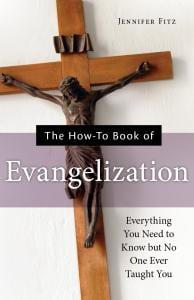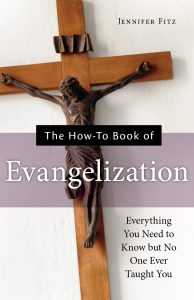#1 It’s Friday, so double the penance. Over at the Blorg I’m writing about the economic fallout of quarantine and what that means for the ordinary Catholic. Includes a photo of me and my red dinosaur plush toy. I’m really getting into the penitential mood.
#2 It turns out I was wrong yesterday. A week and some ago I wrote “5 Ways to Stay Sane During Lent” now up the Register. Which includes the lines the Internet is not your spiritual director. But when I quoted it yesterday, I’d forgotten I’d written it, but remembered I saw it on Twitter spoken by someone else. So that’s interesting. Apparently I am not the only person getting tired of the annual scolding about how everybody’s doing Lent wrong.
#3 Advance praise for the book! From a reader who shall remain anonymous, but FYI this a person who was forced to read the book, did not choose to read the book, and who admits to being rather worn out on the whole topic of evangelization:
This left me going “Hey, that thing over there – I could maybe do that.” So, kudos. You got me to actually like a book on evangelization.
Didn’t see that coming. Woohoo! It really is a good book, and in very good news, I’m done with major edits, unless on my final read-through this weekend I find something I desperately want to change. So prayers, please, that if there is something that needs to be fixed I find it? Yes? Because this is a very broad-audience book, and y’all know just how ornery I can be, when I’m let loose with my words and things.
#4 I’ll just get ornery right now. Read today about an American bishop who’s mandated communion in the hand. He’d like people to maybe quit holding and shaking hands during Mass, but he’s not going to insist, so I guess its up to people in the pews to withstand the glares if they decline to shake hands right before, you know, eating with their hands. Yikes.
So anyway, here’s what happened to me this week: I popped into daily Mass Thursday, and the Mass I attended draws a fairly traditionalist crowd. Majority in attendance receive on the tongue habitually. Father announced that he was going to distribute the sacred host only, no chalice, on account of infection risk. No announcement about how one may or may not receive.
When I went up to receive, sure enough, Father’s perfectly capable of giving communion on the tongue without any contact between his hand and the recipient’s body.
It’s a skill, it’s a skill that can be learned, and sadly it’s not a skill I’ve ever observed practiced among people distributing hand-to-hand.
Thus for the moment, if you have significant reasons to be concerned about catching something, your only safe bet is to only visit ministers of the Eucharist who don’t touch people’s hands or mouths (or other body parts) when they distribute communion, and who also are particular about washing their hands thoroughly before Mass and not touching germy surfaces from there on out.
I’d like to see some parishes get serious about making that happen.
I’d very like to see some dioceses get serious about putting together a plan to protect our priests from highly contagious viruses that disproportionately kill older men and especially older men with various underlying health conditions that are extremely common in the USA, while still allowing those men to carry out their God-given vocations.
#5 Back to gratitude. Earlier this month I was one of the moderators for the Catholic Quiz Bowl of South Carolina. It was a ton of fun and I was thrilled to be able to do it, and considered the free lunch that came with to be all the more thanks required. Still, the organizers not only arranged to have a Mass said in honor of each individual volunteer moderator’s intentions, they also had gift bags for us!
Mine contained this beautiful rosary, one of many prizes donated by The Catholic Company:


Which was what I’ve needed, though I didn’t realize it until I got home.
#6 The reason I need it is because ever since the death of my previous prayer partner, Rosary Dog, I’ve been struggling with getting my rosary prayed, or too often and too consistently just neglecting to pray it. So a shiny new beautiful thing half-enticed and half-guilted me into getting my act together.
It’s sorta working?
So tonight the sun was getting low in the sky and I had a chance to get out for a quick walk after supper, and grabbed that rosary and hit the road, but I woke up with a bit of a cough today and was ready to give up halfway through the Crowning with Thorns. I know!
But then I got back to the yard and decided I’d just wander a little and maybe persevere. I picked at a few weeds coming up in the mint, and before I knew it I’d prayed all the things and also gotten a nice fistful of greens for a rabbit I know.

Photo: Me and Miffy, my new prayer-assistant. Once you have a rabbit, your yard never looks the same again.
And that’s why I can write books on evangelization for people who hate evangelization, and I can write diatribes on shut up already and leave people alone to enjoy their Lent in peace, because I am a person whose prayer life depends largely on the presence of pets.
#7 All you holy men and women? Pray for us.
***
Guys, I’m thrilled to be back on Seven Quick Takes, however inconsistently, because joining in reminds me to go look, and when I go look I find all kinds of good reading. There are some super links posted this week. Check them out.









